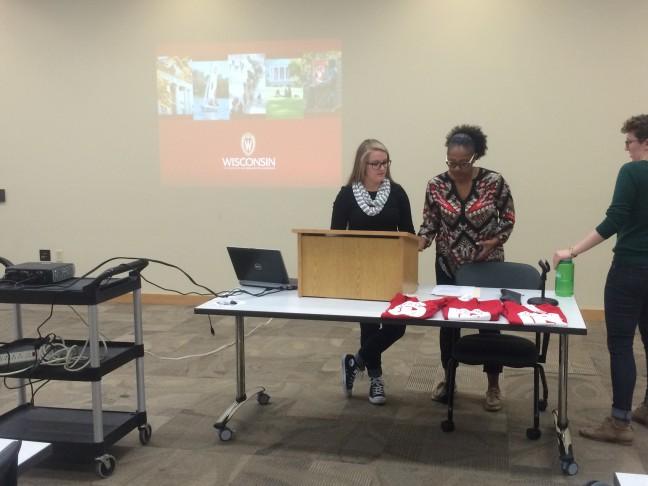University of Wisconsin administration members took a step back Tuesday night to listen to student opinions and concerns about sexual assault on campus and to understand how to implement new policies to prevent sexual assault.
After presenting the Association of American University results from a survey conducted of UW students last spring, student appointees to UW’s Association of American Universities Sexual Assault Task Force, Valyncia Raphael and Kari Hajduk, addressed students with university plans to prevent sexual assault on campus.
The two highlighted nine key areas the university plans to address, including prevention techniques like additional training for students. The university is also seeking to address the disproportional amounts of sexual assaults and harassment in campus housing and Greek life.
“What we really want to do is focus on prevention,” Hajduk said.
Rejecting silence: Student survivors take control, speak out on sexual violence
Raphael said the university plans to further educate first-year students and transfers, and expand online programs, such as the Tonight Program, in order to ensure students have more information about resources on campus, like University Health Services.
UW also plans to try to create more support for groups disproportionately affected by sexual assault and create a sense of greater community involvement, Raphael said. These groups would include fraternities and sororities, graduates and several other social groups.
Though the two didn’t delve deeply into the university’s exact plans, the main focus of the meeting was to encourage student feedback to devise ways the university could implement these plans or other plans they had not yet considered.
After discussing with other students in the room, the whole group, which numbered about two dozen, came back together to discuss their opinions about UW’s plans and what they believed the university should focus on.
Some students discussed the idea of using group-based meetings, rather than online courses like Tonight, to promote student involvement and discussion about sexual assault on campus.
Others believed students could benefit from having their house fellows discuss and address the issues with students on a closer level. Concern for the house fellows’ non-disclosure rule, however, caused worry because students wouldn’t feel comfortable talking to house fellows about sexual assault if they had to tell a housing supervisor.
Hump day: Sexual assault survey fails to fully represent racial, gender identities
Tonya Schmidt, assistant dean of division of student life, explained, currently, if a student tells a House Fellow they were sexually assaulted or harassed, the house fellow has to report to the supervisor on duty. The House Fellow must then provide the student with information on resources for help.
Students also discussed several alternative UW Police Department slogans to be more positive and preventative of sexual assault. One person suggested the slogan “Stand up, don’t stand by” to encourage students to intervene in a case of sexual assault.
As the session came to an end, Raphael emphasized the importance of talking about what had been discussed to other groups around campus.
“Whatever is said here we hope stays here, whatever is learned here we hope leaves here,” Raphael said.
The university task force will compile all the information they gathered from students to ensure they have the student voice when they make their final decisions.
The task force will have three more listening sessions Nov. 2 at Gordon Commons, Nov. 11 at the Red Gym and a live web chat at a date to be determined.













